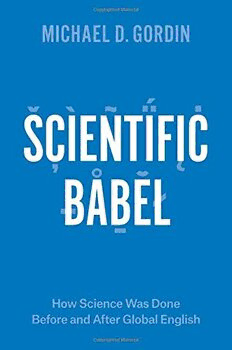
Scientific Babel: How Science Was Done Before and After Global English PDF
Preview Scientific Babel: How Science Was Done Before and After Global English
Scientific Babel Scientific Babel How Science Was Done Before and After Global English Michael D. Gordin The University of Chicago Press Chicago and London Michael D. Gordin is the Rosengarten Professor of Modern and Contemporary History at Princeton University and the author of The Pseudoscience Wars, also published by the University of Chicago Press. The University of Chicago Press, Chicago 60637 The University of Chicago Press, Ltd., London © 2015 by Michael D. Gordin. All rights reserved. Published 2015. Printed in the United States of America 24 23 22 21 20 19 18 17 16 15 1 2 3 4 5 ISBN- 13: 978- 0- 226- 00029- 9 (cloth) ISBN- 13: 978- 0- 226- 00032- 9 (e- book) DOI: 10.7208/chicago/9780226000329.001.0001 Library of Congress Cataloging-in-Publication Data Gordin, Michael D., author. Scientific Babel : how science was done before and after global English / Michael D. Gordin. pages cm Includes bibliographical references and index. ISBN 978-0-226-00029-9 (cloth : alk. paper) — ISBN 978-0-226-00032-9 (e-book) 1. Communication in science. 2. English language— Technical English. I. Title. Q223.G67 2015 501'.4—dc23 2014032723 ♾ This paper meets the requirements of ANSI/NISO Z39.48–1992 (Permanence of Paper). To my language teachers Contents Introduction: Talking Science 1 Chapter 1: The Perfect Past That Almost Was 23 Chapter 2: The Table and the Word 51 Chapter 3: Hydrogen Oxygenovich 79 Chapter 4: Speaking Utopian 105 Chapter 5: The Wizards of Ido 131 Chapter 6: The Linguistic Shadow of the Great War 159 Chapter 7: Unspeakable 187 Chapter 8: The Dostoevsky Machine 213 Chapter 9: All the Russian That’s Fit to Print 241 Chapter 10: The Fe Curtain 267 Chapter 11: Anglophonia 293 Conclusion: Babel Beyond 317 Acknowledgments 327 List of Archives 331 Notes 333 Index 403 Introduction Talking Science Les savants des autres nations à qui nous avons donné l’exemple, ont cru avec raison qu’il écriraient encore mieux dans leur langue que dans la nôtre. L’Angleterre nous a donc imités; l’Allemagne, où le latin sem- blait s’être réfugié, commence insensiblement à en perdre l’usage: je ne doute pas qu’elle ne soit bientôt suivie par les Suédois, les Danois et les Russes. Ainsi, avant la fin du XVIIIe siècle, un philosophe qui voudra s’instruire à fond des découvertes de ses prédécesseurs, sera contraint de charger sa mémoire de sept à huit langues différentes; et après avoir con- sumé à les apprendre le temps le plus précieux de sa vie, il mourra avant de commencer à s’instruire.* Jean Le Rond D’Alembert1 You are able to read this sentence. That is obvious, but it is also quite an achievement. You read English; you may or may not speak it. Some- where along the way, you learned the language, either relatively pain- lessly as a child or with significant exertion later (how significant de- pends a lot on who you are, how you were taught, and what other languages you already happened to know). This book is for both kinds of English- users, but it is not fundamentally a book about English. It is a history of scientific languages, the set of languages by means of which scientific knowledge has been produced and communicated. Whether * “The scholars of other nations, to whom we have provided an example, believed with reason that they would write even better in their language than in ours. England has thus imitated us; Germany, where Latin seems to have taken refuge, begins insen- sibly to lose the use of it: I do not doubt that it will soon be followed by the Swedes, the Danes, and the Russians. Thus, before the end of the 18th century, a philoso- pher who would like to instruct himself about his predecessors’ discoveries will be required to load his memory with seven to eight different languages; and after having consumed the most precious time of his life in acquiring them, he will die before having begun to instruct himself.”
